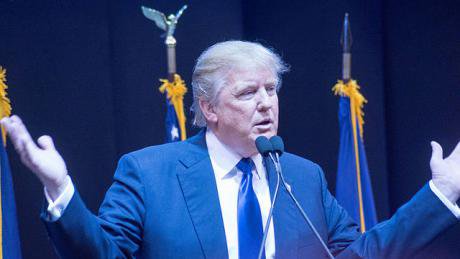
Trump, February 2016. Wikicommons/Marc Nozell from Merrimack, New Hampshire, USA. Some rights reserved.Trump's victory marks a geopolitical turning point that has led many to start talking about ‘the populist era’, in shock at the crushing arrival of this New York tycoon in the capital of Empire.
Faced with events of this magnitude, it’s appropriate to pause to think about the causes and consequences. Some of us have spent years theorising and predicting that the blurring of political faultlines by the centrist progressive consensus would result in a "return of the political", understood as a friction between radically different political projects.
To the extent that the "Third Way” – applied in traditional socio-democratic parties – accepted neoliberal hegemony, it paved the way for a populist logic that would re-establish "the people" as a collective subject. The type of content or meaning acquired by this subject thus becomes fundamental, as the irruption of “the people” into political discourse is not in itself enough to unify us into a common category. Examples range from Trump and Le Pen to Podemos. "Concrete policies" will continue to be necessary in order to win, but they are no longer enough.
Right-wing populism is sometimes reminiscent of the fascism of the thirties, with which it shares some elements. However, categorising it as such hides more than it explains, as right-wing populism proposes new solutions to the problems of a globalised world.
Furthermore, it doesn’t seem to be an oligarchic attack upon the checks and balances of liberal democracy, seeking to replace them with a totalitarian regime. Trump is a right-wing populist in the sense that he represents and channels demands and subjectivities that had been left behind or made invisible by the Washington establishment. These include the impoverishment of ordinary people, the crisis of expectations amongst the white middle class, the loss of global hegemony to China, as well as the erosion of traditional aspects of identity such as masculinity, race, family or religion. Each of Trump's outrageous remarks has been interpreted by wide sections of the population as a blow to "political correctness", which has gone from representing a language of emancipation to being identified with the cultural consensus of traditional elites.
This is symptomatic of the loss of cultural hegemony by the ruling classes in the United States. It explains how demands arising from subaltern groups have coalesced around Trump, a figure who successfully represents the American dream, with all its contradictions, but with an obvious aspirational component.
The US election results are not so much a victory for Trump, as they are a defeat of the establishment personified by Hilary Clinton. The US election results are not so much a victory for Trump, as they are a defeat of the establishment personified by Hilary Clinton.
Politically, the key is to recognise that the demands and the identities excluded by the establishment could have been re-signified and re-articulated in a radically opposite and progressive direction, as Bernie Sanders began to do. Only Sanders could have posed a real challenge to Trump's campaign: "A future you can believe in" is the reverse of "Make America great again", because it doesn’t retreat into moral rejection or resistance politics.
Instead, it embraces the challenge of fighting the political battle on the same terrain, attacking right-wing populism where it hurts the most: in the re-articulation of collective subjects and passions. A wish can only be displaced by another wish, one which is both opposite and more powerful. A wish can only be displaced by another wish, one which is both opposite and more powerful.
It therefore shouldn’t surprise us that a high percentage of blacks, hispanics and women voted for Trump; just as it should not surprise us that large sections of the French working classes, formerly members of the Communist Party, today vote for Le Pen. Any rigorous analysis must start from this deeply volatile and fluid notion: if we don't define what ‘the people’ means, they will do so for us.
In Spain, thanks to the democratic vaccine that was the Indignados movement, and to the fact that Podemos continues to be a transversal and popular force, the victory of a Trump-like figure is unthinkable. "Concrete policies" will continue to be necessary in order to win, but they are no longer enough.
To the extent that the traditional elites remain entrenched in technocracy, hegemony will remain in the hands of neoliberal powers. The counter-hegemonic space, however, will be fought over by populist forces of the right and the left.
This article is translated from the original in the Spanish magazine called El Siglo (with thanks to translators Carmen Williams and Adrián Bua).
Read more
Get our weekly email


Comments
We encourage anyone to comment, please consult the oD commenting guidelines if you have any questions.